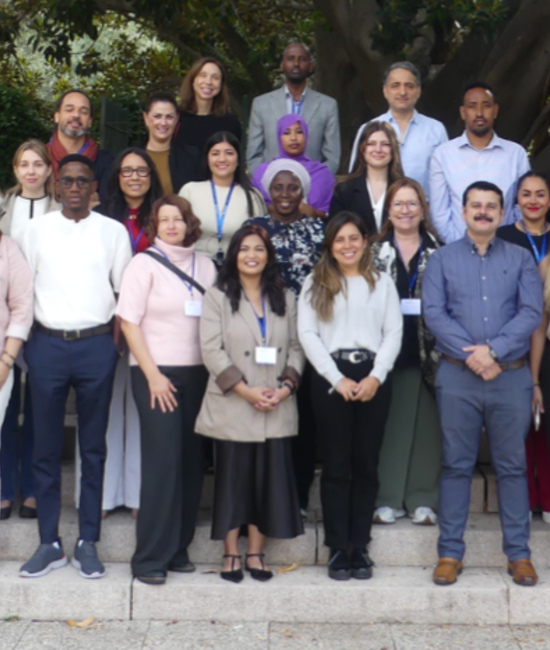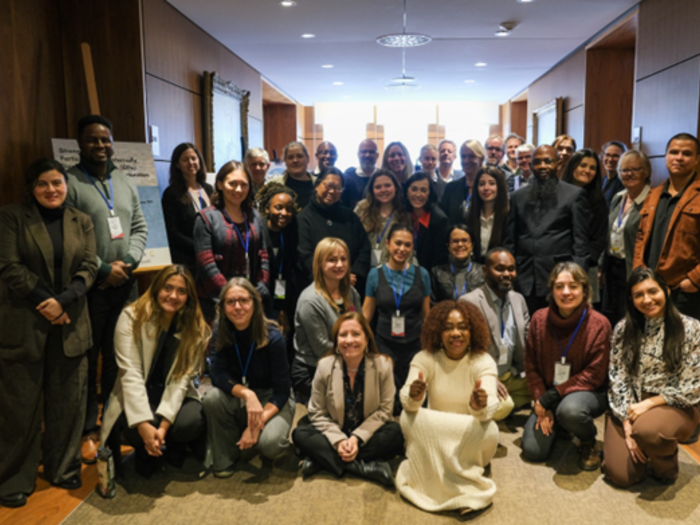IDP Protection Expert Group
IDP Protection Expert Group

The IDP Protection Expert Group – IPEG – is co-led by:
The IPEG engages at a senior level with UN leadership and government officials on key protection challenges through country visits, as well as globally through advocacy and communications. Since its establishment in 2021, IPEG delegations have conducted multiple support missions, including to Burkina Faso, South Sudan, Honduras, Ukraine and Democratic Republic of the Congo, and facilitated dialogue and knowledge-sharing among States on implementing laws and policies on internal displacement.
Text and media 34
Our mission
With internal displacement reaching a record 83.4 million people by the end of 2024 – more than double a decade ago – the national and global response to the plight of the internally displaced continues to fall short. The rise in internal displacement is a persistent global trend, driven by ongoing and emerging conflict, violence and disasters and the failure to achieve durable solutions.
IPEG envisions a world where the rights of internally displaced persons are fully protected. Through expert guidance, high-level advocacy, practical solutions and inclusive approaches that amplify voices of internally displaced persons, foster political will and national leadership and advance senior-level international support, IPEG strengthens protection responses for internally displaced persons.
IPEG’s means of engagement
Protection support missions
Through constructive dialogue and mutual learning, IPEG helps build strategic responses to internal displacement.
Government peer exchange on law and policy on internal displacement
IPEG convenes and facilitates state-to-state peer exchanges on implementation of laws and policies on internal displacement to advance legal and protection outcomes at the national level.
Global-level advocacy and policy debate
IPEG engages in advocacy and policy debates, fostering an exchange of experiences on protection issues related to internal displacement and advocating for improved policies and measures in line with international human rights standards.
Members of the IDP Protection Expert Group
Under the guidance of the Special Rapporteur on the Human Rights of IDPs, IPEG’s members include the former mandate holders and other senior experts on internal displacement across a range of specialities, such as IDP law and policy, peace and security, and disaster displacement. The members are: Paula Gaviria Betancur, Cecilia Jimenez Damary, Walter Kälin, Peter de Clercq, Jennifer Welsh, Atle Solberg, Nina Birkeland, Maya Sahli-Fadel, Elizabeth Ferris and Erin Mooney.
Expert commentaries
Events and dialogues
Text and media 31
OCTOBER 2025
2025 Cross-regional forum on implementing laws and policies on internal displacement
UNHCR and the Special Rapporteur on the Human Rights of Internally Displaced Persons, in collaboration with IPEG, partnered with the International Institute of Humanitarian Law to convene a peer-to-peer exchange in Sanremo, Italy, for local and subnational government officials from 9 countries to advance the implementation of laws and policies on internal displacement.
Text and media 31
SEPTEMBER 2025
2025 Cross-regional forum on implementing laws and policies on internal displacement in Africa
In 2024, UNHCR, the UN Special Rapporteur on the human rights of IDPs and IPEG brought together 13 African country delegations in Dakar for the 2nd Cross-Regional Forum on Implementing Laws and Policies on Internal Displacement. One year later, on 18 September 2025, 11 of these countries reconnected to share updates on their efforts to strengthen national frameworks on internal displacement since the Dakar meeting.
Text and media 30
APRIL 2025
27th anniversary of the Guiding Principles on Internal Displacement
Together with IPEG and IDP Advisory Group panelists, the UN Special Rapporteur on the human rights of IDPs moderated an online event to mark the anniversary of the Guiding Principles on Internal Displacement. The event reaffirmed the relevance of the Guiding Principles and aimed to elevate the participation of IDPs in global discussions on protection and solutions.
Text and media 30 - Copy
DECEMBER 2024
Workshop on strengthening the participation of internally displaced persons
This workshop was co-hosted by the Special Rapporteur on the human rights of IDPs, the IPEG, UNHCR and McGill University. It gathered 40 participants, including 10 IDP leaders, to share their experiences and recommendations regarding participation in the response and solutions for their displacement.
Past events
September 2024: Cross-regional forum on implementing laws and policies on internal displacement in Africa. Summary note | Video
June 2023: Cross-regional forum on implementing laws and policies on internal displacement: Summary note | Video
April 2023: 25th anniversary of the Guiding Principles on Internal Displacement: Global online commemoration: Joint press release | Video recording





